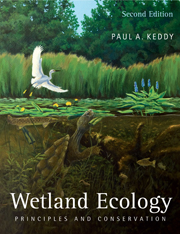Book contents
- Frontmatter
- Contents
- Preface to the second edition
- Preface to the first edition
- Acknowledgments
- 1 Wetlands: an overview
- 2 Flooding
- 3 Fertility
- 4 Disturbance
- 5 Competition
- 6 Herbivory
- 7 Burial
- 8 Other factors
- 9 Diversity
- 10 Zonation: shorelines as a prism
- 11 Services and functions
- 12 Research: paths forward
- 13 Resortation
- 14 Conservation and management
- References
- Index
- Plate section
Preface to the first edition
- Frontmatter
- Contents
- Preface to the second edition
- Preface to the first edition
- Acknowledgments
- 1 Wetlands: an overview
- 2 Flooding
- 3 Fertility
- 4 Disturbance
- 5 Competition
- 6 Herbivory
- 7 Burial
- 8 Other factors
- 9 Diversity
- 10 Zonation: shorelines as a prism
- 11 Services and functions
- 12 Research: paths forward
- 13 Resortation
- 14 Conservation and management
- References
- Index
- Plate section
Summary
According to Bernard Shaw, writer of many a lengthy preface, the lesson intended by an author is hardly ever the lesson the world chooses to learn from his book. If Shaw is right (and who would risk disagreeing with him), why would anyone trouble to write a book? And why a book on wetlands?
In answer to the first question, the motivation of all writers includes a healthy dose of inspiration, frustration, and ego gratification. Events can conspire to feed these forces, with unfortunate consequences for both writers and the public. When Dr Birks first asked me to write this book, I therefore declined. In part, I was not convinced that a need existed.
Bringing a new book into the world requires the shouldering of parental obligations. (While one can keep one's rowdy children at home, a book is always on public display.) The world certainly has too many children, and only the most devoted reader, deep-pocketed publisher, or hardened bibliophile could believe that every author who is inclined towards writing should do so. The self-restraint that is a virtue in biological procreation, may be equally so for aspiring authors.
Events can, however, over-ride caution. Illness, like the threat of a hanging, tends to concentrate and clarify one's mind. Moreover, during the days chained to the wall before the hanging, one is inclined to dwell on shortcomings, particularly those of one's associates. But I digress. This is, after all, a preface to a book on wetlands.
Information
- Type
- Chapter
- Information
- Wetland EcologyPrinciples and Conservation, pp. xiii - xviPublisher: Cambridge University PressPrint publication year: 2010
